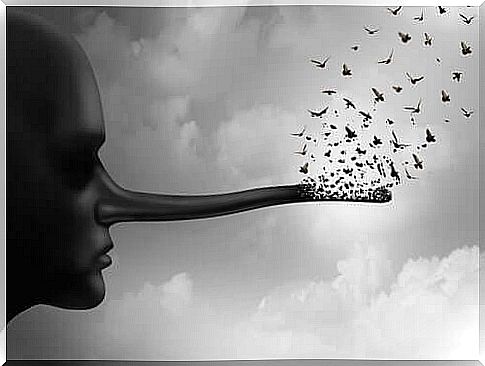White Lies, Compulsive Or Pathological: What Are Yours Like?

Few things sow distrust as much as lies. If you ask other people, they will tell you that no one likes the company of a liar. However, the truth is, socially, we do have some justified lies; we know them as white lies and all people use them to some extent.
A study by the University of Massachusetts found that 60% of adults cannot have a conversation longer than ten minutes without telling a lie.
That’s in case they already know each other, because otherwise, if it’s the first time they talk, the average goes up to three lies during the first ten minutes.
It seems that one of the most uncomfortable truths is the fact that human beings lie almost from birth.
This study was carried out before the creation of social networks. Facebook and Twitter have likely multiplied this data, as they provide a framework in which opportunities to tell lies are greater and far more pervasive.
While many blame digital media as responsible for the lies, the truth is that they have simply amplified the human willingness to tell them.
The psychologist Paul Ekman, an expert in the study of facial expressions, already warned us that the lie is one of the central features of life.
white lies
Almost as soon as children learn to speak, they start using words to deceive. They start with the simplest lies that develop between the ages of two and three, to reach the age of three or four being able to craft much more sophisticated lies.
In developmental psychology, although it seems a contradiction, this is considered a sign of social intelligence.
Children, and many adults, deal naturally with white lies, seen as mere harmless instructions designed to protect their own and others’ feelings. Let’s say they could be treated as the lubricant that smoothes the gears that make society work.

Truths and lies
It seems that, as human beings, we don’t differentiate ourselves by telling truths or lies. The degree and type of lie we tell is what really sets us apart from each other.
From an “I’m fine”, when in reality we are not, to making up an excuse for being late, to the most cruel and interested lie: we have a wide spectrum of degrees and types of lies.
It seems that the need to meet the expectations of others is what drives the human being to lie. Furthermore, we live, grow and educate in sheer contradiction.
We tell children that they shouldn’t lie, while we insist that they pretend to be happy in front of their grandmother’s birthday present, even if they don’t like it.
Our society could collapse if we couldn’t trust the people around us not to lie, but society probably would n’t sustain itself if we always told the truth.
compulsive lies
There are people who, in addition to using white lies, adorn their lives with an endless series of anecdotes, facts or invented or false stories that do not correspond to reality.
These are people who have become addicted to their own fantastic stories because they suffer from deep insecurity. Generally, the only ones harmed by this kind of lie are themselves. These are the compulsive liars.

pathological lies
This type of liar is beginning to be considered a separate species. Cold and calculating, their lies contain specific goals and interests, usually selfish. They are manipulative and cunning lies.
These types of lies, unlike white lies, are used by people who base their lives on them. Their mistakes negatively affect others and cause profound harm to victims.
Through some studies, we now know that the pathological lying have more white matter in the prefrontal area of the brain. Generally speaking, white matter is linked to faster connections, a greater flow of thought, and greater verbal fluency.
In addition, they have empathy difficulties and little activity in the areas responsible for emotions.
Nobody feels good about lying, and most of us don’t like lying. We use white lies to protect ourselves or others. Or that’s what we all want to believe.
In the end, over dogmas or maxims, each one is forced to face an internal debate about the truth, opting for a position that is sensitive to the circumstances.









